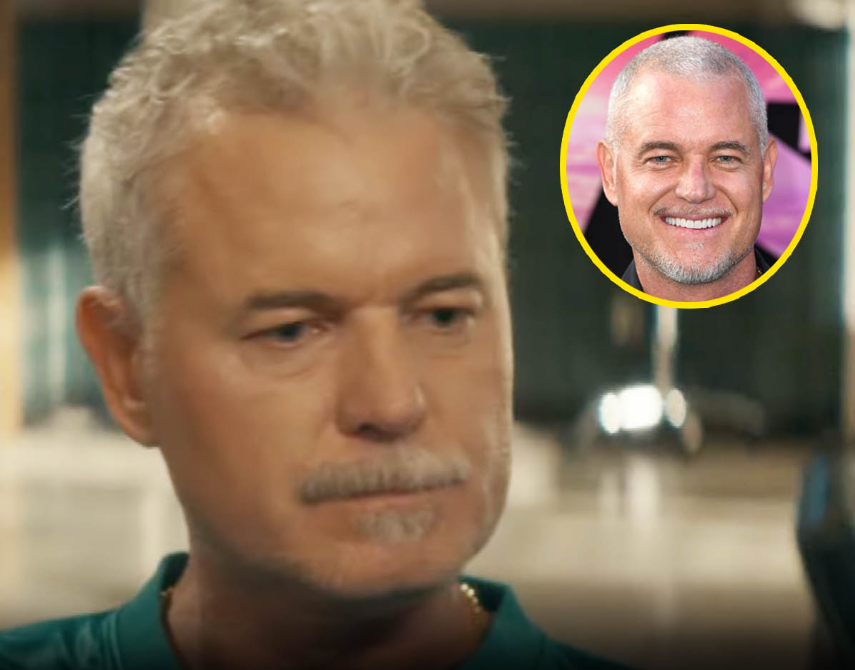Despite the grim news of his ALS diagnosis, Eric Dane didn’t retreat. He returned to the set of Brilliant Minds with a quiet determination that left the entire crew in awe. When he walked through those studio doors, the usual hum of activity seemed to pause. Conversations stuttered, cameras tilted in confusion, and a subtle hush fell over the room as if everyone collectively realized the gravity of the moment. Here was a man, once physically vibrant and commanding, visibly altered by a disease that robs strength and mobility, yet somehow carrying a presence that filled the space more powerfully than anyone could have anticipated. Every step, every breath, carried the weight of resilience, and everyone around him felt it immediately, an unspoken tension vibrating through the air, thick with both concern and admiration.
When the cameras cut, what followed was extraordinary, the kind of moment that becomes etched in memory forever. Crew members found themselves frozen, mouths slightly agape, as if they couldn’t quite reconcile the fragility of the human body with the enormity of the courage in front of them. Then, as the silence stretched, one person clapped. Another joined. Within seconds, the applause swelled, louder and more fervent than anyone could have planned. Tears streamed down faces, not just for the drama unfolding on screen, but for the bravery standing just a few feet away. Applause rolled like waves, disbelief etched on every face, until a full, unbroken standing ovation erupted — ten minutes, twenty minutes, each second a tribute to something deeper than entertainment. The sound reverberated through the studio, into every corner, reminding everyone present that true courage often arrives quietly, then suddenly commands the room.
They weren’t clapping merely for a famous actor or a beloved TV star. They were honoring a man choosing, with astonishing resolve, to stand in the harshest light imaginable, where every movement and gesture demanded energy he no longer had in abundance. Eric Dane, whose body bore visible signs of ALS, stepped into a scene that mirrored his own life, and instead of hiding from reality, he transformed it into something profoundly human, courageous, and inspiring. His performance wasn’t about illusion, polish, or pretending everything was fine; it was about truth, raw and unflinching, delivered with authenticity that cut deeper than any scripted line could. Every word he spoke, every subtle expression, carried layers of experience, fear, defiance, and determination. Watching him, the crew realized they weren’t witnessing a role; they were witnessing a life boldly refusing to be diminished.
On that Thanksgiving episode, the set became more than a filming location; it became a space of collective empathy, respect, and reverence. Dane was surrounded by colleagues who knew exactly the price of showing up — the physical toll, the emotional strain, the vulnerability exposed to the public gaze. Yet, despite all of it, he chose to be present, to give everything he could to a story that resonated far beyond its fictional world. The scripted scene blossomed into a living tribute, a vivid portrayal of what it means to confront adversity head-on while inspiring those around you. His courage became a shared experience: a silent contract between him and every viewer, every crew member, and every colleague witnessing his determination. The applause that lasted ten minutes wasn’t a ceremonial courtesy. It wasn’t nostalgia for past performances on Grey’s Anatomy or any previous fame. It was a recognition of something deeper: of a person embracing vulnerability with dignity, of a human being defying expectations while facing the unrelenting cruelty of disease.
For those families waking every day with ALS, watching a loved one fade bit by bit while retaining spirit and humanity, Eric Dane’s performance offered something rare: visibility, acknowledgment, and hope. In choosing to return to set, to keep working, to tell this story as truthfully as possible, he gave ALS a face — one that millions could see, understand, and empathize with. His presence reminded everyone that courage is not a grand, cinematic gesture; it’s often the quiet insistence to show up, to participate fully, to give your all even when everything inside you whispers to stop. Every glance he shared on camera, every fragile movement, carried an enormous weight of meaning that words alone could never capture. He became, in that room, in that episode, a beacon of resilience, demonstrating that even in the face of a devastating diagnosis, life’s work and purpose can continue to shine.
By the time filming wrapped, the room held a palpable sense of gratitude and awe. Crew members spoke in hushed tones about the power of presence, actors quietly wiped tears from their eyes, and every camera operator, script supervisor, and stagehand carried home a lesson in humanity they would never forget. Dane had done something remarkable: he’d turned personal struggle into communal inspiration. He reminded the world that courage isn’t measured in feats or awards, but in showing up when everything in your body says you can’t. In that moment, ALS was no longer just a diagnosis. It became a lens through which millions could see bravery, vulnerability, and the undying human spirit.
Eric Dane’s choice to walk back onto set that day gave a gift far beyond entertainment: it offered a story of courage that would ripple across families, fans, and viewers around the globe. It reminded us all that facing the hardest truths doesn’t weaken us; it transforms us. And in the glow of that standing ovation, still echoing in memory, we witnessed what it truly means to fight, to live, and to shine — even when the odds are insurmountable, even when the world is watching with bated breath.
